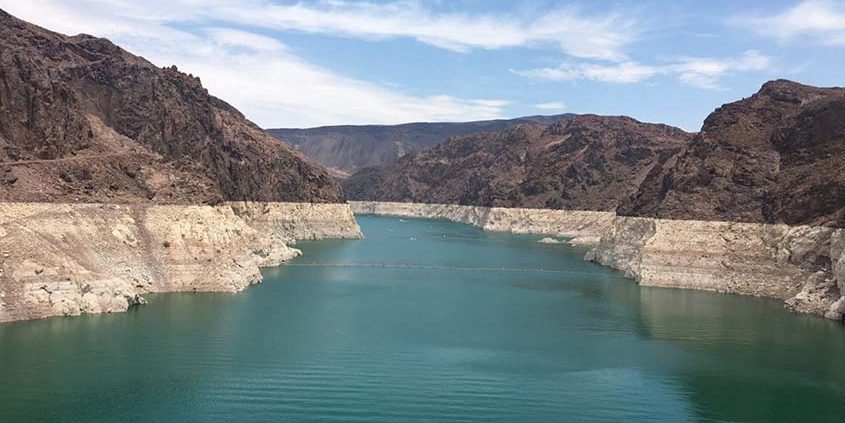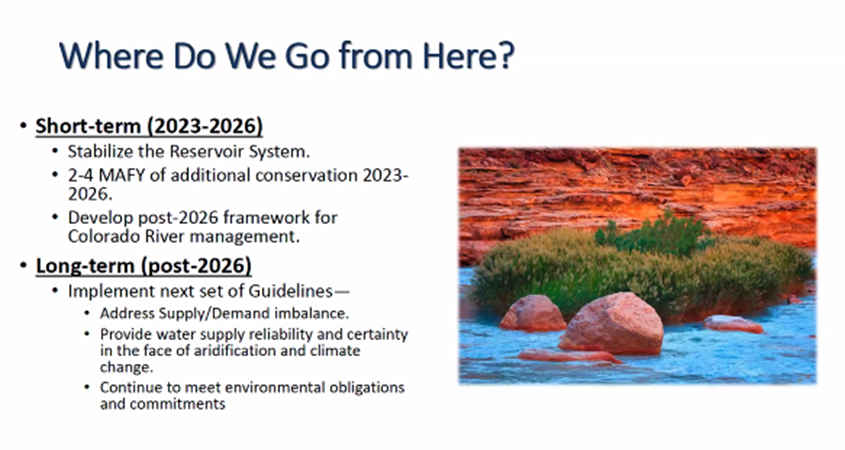 Water managers and other officials discussed ways to slow or stabilize the rate of decline of the Colorado River Basin, a major source of water for seven states and Mexico. Photo: U.S. Bureau of Reclamation
Water managers and other officials discussed ways to slow or stabilize the rate of decline of the Colorado River Basin, a major source of water for seven states and Mexico. Photo: U.S. Bureau of ReclamationCollaboration Key to Stabilizing Colorado River Basin Decline
Collaboration among all water users is key to developing solutions for the Colorado River Basin, which is in the midst of a 22-year megadrought. That was one of the common themes during a webinar Thursday, in which water managers and other officials discussed ways to slow or stabilize the rate of decline of the major source of water for seven states and Mexico.
“A Collaborative Approach to Colorado River Management,” was part of the Southern California Water Coalition‘s “What Matters” webinar series. The San Diego County Water Authority, Imperial Irrigation District, Black & Veatch, and Richard Brady & Associates sponsored the webinar.
Webinar participants:
- Sandra Kerl, San Diego County Water Authority General Manager
- Henry Martinez, Imperial Irrigation District General Manager
- Adel Hagekhali, General Manager of the Metropolitan Southern California Water District
- David Palumbo, Deputy Commissioner – Operations, U.S. Bureau of Reclamation
- Thomas Tortez, Jr., Tribal Chairman, Torres Martinez Desert Cahuilla Indians
- Michael Cohen, Senior Associate, Pacific Institute
- Chris Harris, Executive Director, Colorado River Board of California
A picture's worth a thousand words… pic.twitter.com/seesz9fYOe
— SoCal Water Coalition (@SoCalWaterComm) October 6, 2022
“Unprecendented” and “challenging times”
During the 90-minute discussion, speakers said that drought and climate change impacts on the Colorado River Basin have created “challenging times” and that “unprecedented times require unprecendented management” solutions. Solutions mentioned included sustainable conservation, additional storage, a reduction in demand, and inclusion of all users to ensure the long-term health of the river system.
Sandy Kerl, General Manager @sdcwa, highlights that 2/3's of their supply comes from CO River and her top 3 priorities are
1) Balance impact on users while protecting environment (& Salton Sea)
2) Uphold law of the river and priority rights/QSA
3) Expand Lake Mead surplus program— SoCal Water Coalition (@SoCalWaterComm) October 6, 2022
The Water Authority’s supply portfolio includes high-priority, conserved Colorado River supplies negotiated through the landmark 2003 Quantification Settlement Agreement, or QSA. The conserved supplies are the cornerstone of the San Diego region’s long-term water supply diversification strategy.
Chris Harris, Executive Director, Colorado River Board of California, stresses that we need to stop referring to basin conditions as a "drought" – it's aridification. @adelh2o General Manager with @mwdh2o agrees – "We have to adapt to a changing climate."
— SoCal Water Coalition (@SoCalWaterComm) October 6, 2022
Colorado River Basin: Voluntary reductions from California
The webinar came a day after California water agencies that use Colorado River water supplies, sent a letter to the U.S. Department of the Interior and U.S. Bureau of Reclamation, voluntarily offering to reduce their use of water from the river starting in 2023:
“Given dire drought conditions across the region and dangerously low reservoir levels, we firmly believe that all water users within the Basin must take immediate voluntary actions to stabilize water supplies in the Basin’s major reservoirs.
“California water agencies that utilize Colorado River water supplies propose to conserve up to an additional 400,000 acre-feet of water in Lake Mead each year, beginning in 2023 and running through 2026. This water, which would otherwise be used by California’s communities and farms, will meaningfully contribute to stabilizing the Colorado River reservoir system. While a broad multi-state agreement to conserve water across the Basin has not been reached, the California agencies propose to take voluntary action now to conserve water in coming months.”

Graphic shared October 6, 2022, during the Southern California Water Coalition webinar “A Collaborative Approach to Colorado River Management.”
(Editor’s note: The October 5 webinar was recorded and, when posted, can be viewed/heard here: socalwater.org/podcasts/).



